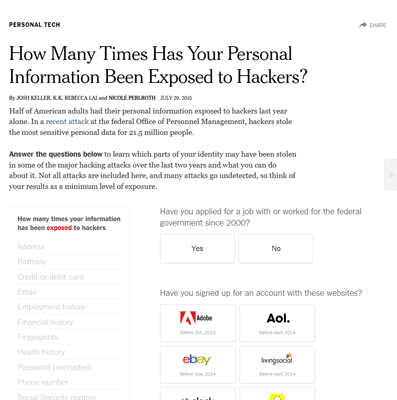
2015
was a great year to point out how screwed up the government is when it comes
to computers. And things have just gotten worse since then!
If the FBI and the CIA can't keep their computers from being hacked what
are the rest of us supposed to do? Well, not trusting the government
with our secrets is one good idea. No wonder Hillary Clinton didn't
want her emails on a government server. Was she right? Time will tell.
Below are the biggest cases of cyber-theft of 2015 listed in least awful
to most awful order. Fortunately most individuals won't
be breached this way unless they are working on secrets the Chinese
really want to steal. But everyone suffers as consumers when our data is
stolen from huge companies and insurance companies are forced to pay for
the mess.
VTECHThe toymaker suffered a major
breach in late November, with hackers taking 4.8 million records, as well
as a database of first names, genders and birthdays of more than 200,000
kids. The attack on VTech, which reportedly used poor password security
among other issues, ranks as one of the largest breaches of the year .
SECURUSThe big scandal when an anonymous hacker
stole about 70 million phone calls from inmates in US prisons wasn't the
hack itself, it was the suggestion that attorney-client privilege may have
been violated on a regular basis. Millions of call logs and thousands of
call recordings were taken in the breach. Securus provides landline phones
and equipment to prisons, and generates high profits by charging the inmates
themselves -- so much so, the FCC has taken action against the firm.
FBIThe same hackers who were able to get access
to CIA director John Brennan's private email account also got access to
a law enforcement portal used by police and federal agents to share intelligence,
and book arrested suspects. It's not clear how many records were in the
system -- the FBI declined to comment -- but hundreds of thousands of users
are cleared to use the portal. Many of those names were also leaked in the
hack. The attack was thought to be one of the widest external breaches of
law enforcement this year.
DONALD TRUMP HOTELS
A hack that targeted seven of Donald Trump's hotels, and lasted
the whole year: even the presidential candidates aren't immune to hacks.
Hackers snuck malware onto Trump systems, stealing credit card data (including
security codes and card numbers) in the firm's hotels across the US. No
final figure of how many people were affected was ever reported, but it's
thought to be in the many thousands.
PATREON
Crowdfunding service Patreon got the "Ashley Madison"
treatment when it found its entire cache of data published online in a massive
data breach in early October. Names, email addresses, and posts were leaked,
though credit card data and Social Security was not compromised. The scope
of the breach may take time to become fully clear, but at 15GB in size,
and millions of accounts already found, the number of potential victims
is only set to get larger.
EXPERIAN/T-MOBILE
T-Mobile may have taken over Sprint to become third place in US
cellular rankings, but it's seventh place in our list of breaches, thanks
to its misplaced trust in Experian. The credit agency suffered a breach
in September, affecting as many as 15 million T-Mobile customers who underwent
credit checks. Data, such as names, addresses, social security numbers,
birth dates, and even passport numbers, may have been taken. Encrypted Social
Security numbers may also have been swiped, but the company warned that
encryption may have been compromised.
SCOTTTRADE
The retail brokerage firm said it detected "illegal activity
involving our network" two years prior. Hackers reportedly took millions
of customer contact details, which cybersecurity reporter Brian Krebs suggested
it was to facilitate stock scams through spam campaigns. It was revealed
in November after a case was unsealed that a total of four men had been
charged with hacking into JPMorgan Chase and a number of other financial
institutions, Scottrade included.
ASHLEY MADISON
Around 37 million people were caught up in the Ashley Madison affair
(for want of a better term). The site encourages its users to cheat on their
partners. Aside from the many millions affected and the impact on relationships,
should that information get into the hands of the enemy -- think, Russia
or China -- it could lead to a considerable blackmail and espionage effort
against US, UK, and allied countries.
EXCELLUS BLUE CROSS/BLUE
SHIELD
Excellus BlueCross BlueShield suffered a major hit on
its networks that ended up leaking more than 10 million records. The attack
happened two years earlier in late December 2013. Names, birth dates, Social
Security numbers and mailing addresses -- some of the most personal data
going -- was taken, including financial account and claims information.
The source of the hack remains unknown.
CARPHONE WAREHOUSE
The UK's biggest data breach of the year can go to Carphone Warehouse,
a phone retail store. As many as 2.4 million customers (roughly 4 percent
of the country's population) had their personal information taken in the
breach. About 90,000 customers had their encrypted credit card data stolen.
The UK data privacy watchdog is now investigating the breach.
CVS/WALLGREENS/OTHERS
Pharmacy chain CVS was forced
to pull its popular online photo print ordering site offline as it investigated
a suspected hack. Credit card data, email and postal addresses, phone numbers,
and passwords were taken, but it's not clear how many millions were affected
by the breach. No other linked data was taken in the breach, but Costco
and Rite Aid, among others, were also hit.
UCLA HEALTH
Data breaches and hacks happen all the time. But poor security
and a lack of encryption can put the blame entirely on the body that was
charged with protecting it. UCLA Health was at least partially to blame
when it was hit by a massive hack on 4.5 million records earlier this year,
because its customer data -- including Social Security numbers, and even
medical data, such as conditions, medications, procedures, and test results
-- was not encrypted.
HACKING TEAM
An unknown
group of hackers brought Italian surveillance firm Hacking Team to its knees
when its entire network was breached -- and subsequently published online.
Who were the real victims? The ordinary public, after hackers took working
Flash exploits from the cache of leaked files. It's not known how many internet
users were hit by the subsequent attacks. There may be more to come.
IRSThe IRS data breach, reported in May, affected
around 100,000 taxpayers. That may seem like a paltry number compared to
the Anthem or UCLA breaches, but the impact on affected taxpayers could
be staggering. A flaw in the IRS' system allowed hackers to access past
filed tax returns, including sensitive financial information and Social
Security data. It's said that the breach cost taxpayers $50 million in fraudulent
claims.
UNITED STATES OFFICE OF PERSONNEL MANAGEMENT
The big finale is the OPM breach, which affected 22.1 million (and
counting). It could be the single most damaging breach to US national security
of all time. Those who have access to some of the most sensitive data in
the world had their entire backgrounds checks -- conducted by the OPM --
stolen by an unknown assailant. Imagine if the enemy knew exactly which
buttons to push in order to blackmail someone into turning over vast swathes
of sensitive or classified data. We have yet to see the repercussions of
the breach, but it could harm the US' domestic and foreign diplomatic and
intelligence work.
 According to the New York Times, "Half of American adults had their
personal information exposed to hackers last year alone. In a recent attack
at the federal Office of Personnel Management, hackers stole the most sensitive
personal data for 21.5 million people. "
According to the New York Times, "Half of American adults had their
personal information exposed to hackers last year alone. In a recent attack
at the federal Office of Personnel Management, hackers stole the most sensitive
personal data for 21.5 million people. " 2015
was a great year to point out how screwed up the government is when it comes
to computers. And things have just gotten worse since then!
If the FBI and the CIA can't keep their computers from being hacked what
are the rest of us supposed to do? Well, not trusting the government
with our secrets is one good idea. No wonder Hillary Clinton didn't
want her emails on a government server. Was she right? Time will tell.
Below are the biggest cases of cyber-theft of 2015 listed in least awful
to most awful order. Fortunately most individuals won't
be breached this way unless they are working on secrets the Chinese
really want to steal. But everyone suffers as consumers when our data is
stolen from huge companies and insurance companies are forced to pay for
the mess.
2015
was a great year to point out how screwed up the government is when it comes
to computers. And things have just gotten worse since then!
If the FBI and the CIA can't keep their computers from being hacked what
are the rest of us supposed to do? Well, not trusting the government
with our secrets is one good idea. No wonder Hillary Clinton didn't
want her emails on a government server. Was she right? Time will tell.
Below are the biggest cases of cyber-theft of 2015 listed in least awful
to most awful order. Fortunately most individuals won't
be breached this way unless they are working on secrets the Chinese
really want to steal. But everyone suffers as consumers when our data is
stolen from huge companies and insurance companies are forced to pay for
the mess.